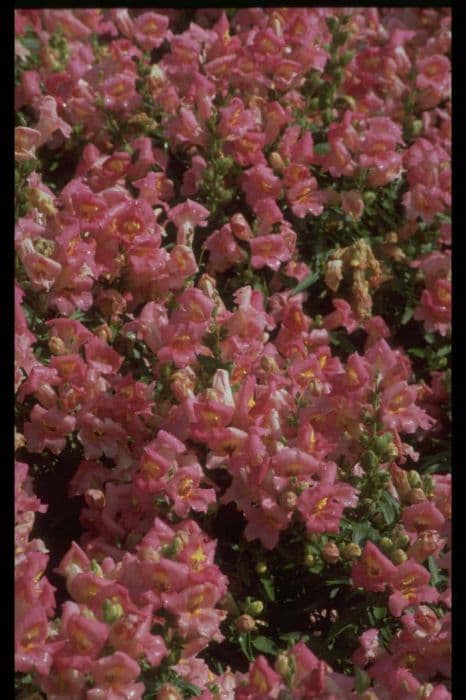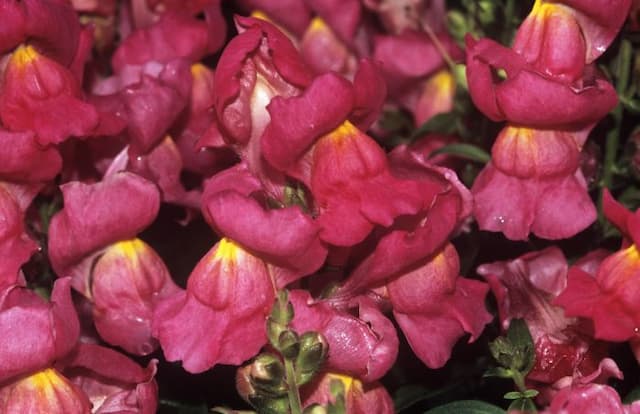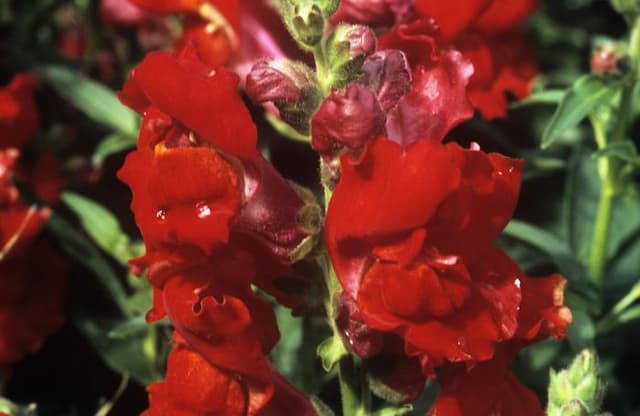Foxglove Digitalis × valinii Foxlight Rose Ivory = 'Takforoiv' (PBR) (Foxlight Series)
![foxglove [Foxlight Rose Ivory]](/_next/image?url=https%3A%2F%2Fplants-admin.emdemapps.com%2Fimages%2Fplants%2F%2Fimages%2F604b57d396f5d.png&w=3840&q=75)
ABOUT
The Digitalis × valinii Foxlight Rose Ivory, commonly known as Foxglove 'Takforoiv', is a striking perennial with an array of exquisite floral and foliage characteristics. It boasts a beautiful blend of blooms that are a mix of peach, rose, and ivory shades. The flowers resemble elongated bells, gracefully hanging from one side of the tall, slender spikes and adding a touch of elegance to the garden. The inside of the bell-shaped flowers is often adorned with speckles or spots, providing an intricate visual texture that attracts both the human eye and pollinators alike. The plant's foliage consists of large, ovate leaves that possess a lush green color, contributing a robust and full basal clump. These leaves serve as an attractive backdrop to the captivating flower spikes, enhancing the overall aesthetic of the plant. The foliage texture is also noteworthy, with a slightly downy or hairy feel that adds to the tactile experience of the garden. This variety of Foxglove is part of the Foxlight Series known for their showy flowers and extended blooming period, which can add prolonged color and visual interest to any garden setting. The flowers form a dense and striking vertical accent, making it a delightful specimen for mixed borders or cottage garden designs. With its captivating colors and charming floral display, the Foxlight Rose Ivory is a favorite among garden enthusiasts, offering a spectacle that pleases both in close inspection and when viewed from afar.
About this plant
 Names
NamesFamily
Plantaginaceae
Synonyms
Foxlight Rose Ivory Foxglove, Rose Ivory Digitalis
Common names
Digitalis × valinii Foxlight Rose Ivory = 'Takforoiv' (PBR) (Foxlight Series).
 Toxicity
ToxicityTo humans
Foxglove is known for its toxicity to humans. All parts of the plant contain cardiac glycosides, which can be dangerous if ingested. Symptoms of foxglove poisoning may include nausea, vomiting, diarrhea, severe headache, abdominal pain, and dizziness. The most serious effects target the heart and can lead to an irregular heartbeat, which can be potentially life-threatening. Immediate medical attention is necessary if foxglove ingestion is suspected.
To pets
Foxglove is similarly toxic to pets as it is to humans. If pets ingest any part of the plant, they may suffer from symptoms such as vomiting, diarrhea, weakness, cardiac abnormalities, and possibly seizures. Due to the presence of cardiac glycosides, the consequences can be severe, such as changes in heart rate, heart rhythm disturbances, and even death. Urgent veterinary care is required if a pet has consumed foxglove.
 Characteristics
CharacteristicsLife cycle
Perennials
Foliage type
Semi-evergreen
Color of leaves
Green
Flower color
Ivory
Height
2 feet 6 inches [76 cm]
Spread
1 foot 8 inches [50 cm]
Plant type
Herb
Hardiness zones
5
Native area
Hybrid
Benefits
 General Benefits
General Benefits- Attracts pollinators: The flowers of the Digitalis, or Foxglove, are known to attract bees, butterflies, and other beneficial insects to the garden.
- Ornamental value: Foxlight Rose Ivory Foxglove adds visual interest to a garden with its striking flowers and can be used as part of a border or in floral arrangements.
- Extended blooming period: This particular variety often enjoys a long flowering season stretching from late spring into early fall.
- Drought tolerance: Once established, Digitalis × valinii Foxlight Rose Ivory has good drought tolerance, making it suitable for gardens in dryer climates.
- Low maintenance: This plant generally requires minimal maintenance, making it ideal for gardeners who prefer plants that do not require a lot of care.
- Deer resistance: The Digitalis × valinii Foxlight Rose Ivory is noted for being resistant to deer, which can be beneficial in areas where deer predation is a problem.
- Colour variety: The 'Takforoiv' cultivar provides a unique color that can complement a wide array of other plants in a mixed display.
- Versatile planting options: It can be planted in garden beds, borders, or containers, offering flexibility in garden design and space utilization.
 Medical Properties
Medical PropertiesThis plant is not used for medical purposes.
 Air-purifying Qualities
Air-purifying QualitiesThis plant is not specifically known for air purifying qualities.
 Other Uses
Other Uses- Photography backdrop: The unique coloration of Foxglove 'Foxlight Rose Ivory' can provide a visually appealing background for macro or portrait photography.
- Educational tool: Because of its intricate flower structure, Foxglove 'Foxlight Rose Ivory' can be utilized in botanical studies to illustrate the characteristics of the Plantaginaceae family.
- Bee attraction in gardens: The tubular flowers of the Foxglove 'Foxlight Rose Ivory' are known to attract bees, making it an excellent choice for pollinator gardens.
- Fairy gardens: Its enchanting appearance makes Foxglove 'Foxlight Rose Ivory' a whimsical addition to fairy gardens or other themed miniature garden settings.
- Artistic inspiration: Artists may use the Foxglove 'Foxlight Rose Ivory' as a subject in painting, drawing, or other visual arts due to its striking appearance.
- Wedding decor: Because of its elegant spikes of flowers, Foxglove 'Foxlight Rose Ivory' can be used in floral arrangements for weddings and other special events.
- Erosion control: Planting Foxglove 'Foxlight Rose Ivory' on slopes can help reduce erosion as its root system stabilizes the soil.
- Natural dye: The petals of Foxglove 'Foxlight Rose Ivory' potentially can be used to create natural dyes for textiles, though this use would require experimentation and a significant quantity of flowers.
- Garden color theme: Its pastel hues can be integrated into garden landscapes to maintain specific color themes or to create a gradient effect along with borders.
- Seasonal interest: Planted among evergreens or winter-interest plants, Foxglove 'Foxlight Rose Ivory' can add a splash of color in spring and summer, enhancing the garden's seasonal appeal.
Interesting Facts
 Feng Shui
Feng ShuiThe Foxglove is not used in Feng Shui practice.
 Zodiac Sign Compitability
Zodiac Sign CompitabilityThe Foxglove is not used in astrology practice.
 Plant Symbolism
Plant Symbolism- Healing: Digitalis, commonly known as Foxglove, contains digitalin, a compound used in heart medications. It symbolizes healing and recovery.
- Care: The nurturing required to cultivate Foxgloves, with their specific soil and light conditions, symbolizes care and attentiveness.
- Protection: Foxgloves have historically been used in folk medicine to ward off evil, symbolizing protection and safety.
- Insincerity: In the Victorian language of flowers, Foxgloves were sometimes associated with insincerity, possibly due to their toxic nature if ingested.
- Stateliness: The tall spikes of Foxglove blooms represent stateliness and commanding presence, as they tend to stand out in a garden.
 Water
WaterFoxglove 'Foxlight Rose Ivory' should be watered thoroughly when the top inch of soil feels dry to the touch, which generally means weekly during the growing season. Depending on temperature and humidity, this could be more frequent; heatwaves may necessitate watering twice a week. Always check the soil moisture before watering. Saturate the soil slowly with water until you see excess water draining from the bottom of the pot, indicating that the soil is fully moistened. During dormant or cooler periods, reduce watering to every other week, ensuring the soil does not remain soggy as this can lead to root rot.
 Light
LightFoxglove 'Foxlight Rose Ivory' thrives in partial sunlight to light shade. The ideal spot for this plant would be one where it receives morning sun and is protected from the intense afternoon sun. It's important to provide bright but indirect light for the majority of the day, as too much direct sunlight can scorch the leaves, while too little light can cause weak growth or prevent flowering.
 Temperature
TemperatureFoxglove 'Foxlight Rose Ivory' prefers moderate temperatures and can survive in a range between about 40 to 90 degrees Fahrenheit. The ideal temperature for robust growth is between 60 and 80 degrees Fahrenheit. Avoid exposure to temperatures below freezing, as frost can damage or kill the plant.
 Pruning
PruningFoxglove 'Foxlight Rose Ivory' should be pruned to remove spent flower spikes, which encourages a second flush of blooms. Pruning can also help maintain the plant's shape and promote a more bushy growth. The best time for pruning is immediately after the first wave of blooming fades, typically in late spring or early summer. Cut the flower stalks back to the base to promote new growth.
 Cleaning
CleaningAs needed
 Soil
SoilFor the Foxglove hybrid 'Takforoiv', the best soil mix is well-drained and rich in organic matter with a slightly acidic to neutral pH of 5.5 to 7.0. A good mix would be one part garden soil, one part peat moss or compost, and one part perlite or coarse sand to ensure adequate drainage.
 Repotting
RepottingThe Foxglove hybrid 'Takforoiv' does not need frequent repotting; it should be repotted every 2-3 years or when the plant has outgrown its current pot. It is a perennial and may often be treated more like a garden plant than a conventional potted houseplant.
 Humidity & Misting
Humidity & MistingThe Foxglove hybrid 'Takforoiv' prefers moderate humidity levels but is quite adaptable and does not require any special humidity considerations when grown in a typical home environment. Ensure good air circulation to prevent fungal diseases.
 Suitable locations
Suitable locationsIndoor
Place in bright, indirect light and keep evenly moist.
Outdoor
Plant in part shade, protect from harsh sun, ensure moist soil.
Hardiness zone
4-9 USDA
 Life cycle
Life cycleFoxlight Rose Ivory, a perennial plant, begins its life cycle as a seed, germinating in warm, moist soil conditions typically during the spring. Seedlings emerge and develop into rosettes, with the plant focusing its energy on establishing a strong root system. In its first year, vegetative growth dominates, producing a mound of lance-shaped leaves. The second year and onward, Foxlight Rose Ivory enters the flowering stage during late spring or early summer, where spike-like racemes of tubular, rose-pink flowers with speckled throats appear, attracting pollinators like bees and hummingbirds. After pollination, the plant produces small capsule fruits that disperse seeds, allowing the life cycle to continue. As winter approaches, above-ground foliage may die back, with the plant entering dormancy, relying on its root structure to survive the cold before resuming growth in the spring.
 Propogation
PropogationPropogation time
Spring to Summer
The most popular method of propagating the Foxglove 'Foxlight Rose Ivory' is through basal cuttings. In spring, when the new shoots are about 2-3 inches (5-7.6 cm) tall with their own roots, gardeners can carefully slice them from the main plant with a sharp, sterile knife. The cutting should include part of the original plant's stem tissue, which will help in rooting. These cuttings are then typically potted in a mix of peat and perlite or sand, and are kept moist and under indirect sunlight until strong enough to be planted out after the risk of frost has passed. It is essential to maintain high humidity around the cuttings, either by covering with a plastic bag or placing them in a propagator.









